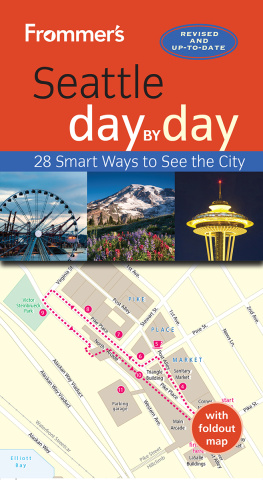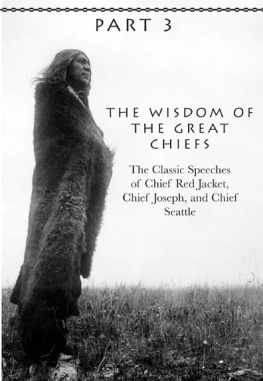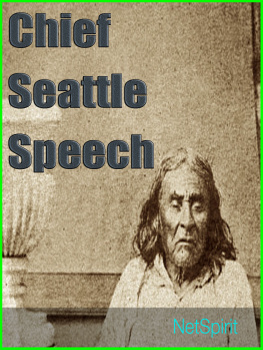Copyright 1997 by the University of Washington Press
Printed in the United States of America
All rights reserved. No portion of this publication may be reproduced or transmitted in any form or by any means, electronic or mechanical, including photocopying, recording, or any information storage or retrieval system, without permission in writing from the publisher.
Library of Congress Cataloging-in-Publication Data
Furtwangler, Albert, 1942
Answering Chief Seattle / Albert Furtwangler.
p. cm.
A Samuel and Althea Stroum book,
Includes bibliographical references.
ISBN 0-295-97633-0 (alk. paper)
1. Seattle, Chief, 1790-1866 Oratory. 2. Speeches, addresses, etc., Suquamish. 3. Suquamish Indians History. 4, Puget Sound Region (Wash.) History. 5, Human ecology, I. Seattle, Chief, 1790-1866. II. Title.
E99.S85S433 1997
979.7'004979dC21
[B] 97-8896
CIP
The paper used in this publication meets the minimum requirements of American National Standard for Information Sciences-Permanence of Paper for Printed Library Materials, ANSI Z39.48-1984.
This book is published with the assistance of a grant from the Stroum Book Fund, established through the generosity of Samuel and Althea Stroum.
ISBN 978-0-295-80038-7 (electronic)
PREFACE
THE CHAPTERS THAT FOLLOW attempt to probe, weigh, stretch, and reconsider a literary and historical puzzle. In 1887 a columnist in a Seattle newspaper published a long speech by the Indian leader after whom the city was named. The writer claimed that Seattle (or Sealth) had made this speech at a great meeting on the waterfront in the 1850s, a good thirty years earlier. The speech was a reply to some remarks by the first territorial governor, Isaac I. Stevens, and it protested against the disappearance of Indian lands and ways under the pressure of recent white settlement. Over the years this speech has been modified, rewritten, embellished, broadcast, excerpted, popularized, discussed, and carved into many a monument. But what exactly it is, how it emerged into print, and what its occasion was or could have been have remained inadequately explained.
No other source or record of this speech has turned up since 1887. No earlier notes, fragments, or closely parallel speeches by Seattle have come to light What has emerged instead over the decades is a heightened awareness about Indian oratory, a recognition that it has often been celebrated by literate Europeans and Americans for their own purposes. It has been used to hold Indians at: a distance, as noble, tragic, but very different peoples. Speeches of protest, in particular, show up again and again in American history as documents that prove the greatness of a vanished or vanishing race.
Is the Seattle speech a surviving record of an actual event? Or is it a fabrication from white men's pens and presses, a subtle reshaping of history designed to mold Indian ideas or characters into a justification of modern developments? The available evidence lends itself to both interpretations. The text printed in 1887 contains many telltale touches that seem not contrived but authentic, accurate reflections of conditions and Indian beliefs in the 1850s. On the other hand, it is also a manifestly translated text. It bears many marks of the white American settler who wrote it and of the like-minded readers he addressed.
To see into this puzzle, this book sifts textual, historical, and literary evidence. The opening chapters look, in turn, at the legendary dimensions of the speech as it is usually presented (as a Great Confrontation between a towering Indian and a short and officious American empire builder); at the textual problems plaguing every version of the speech since 1887; and at the historical circumstances of every known meeting between Seattle and Governor Stevens in the early 1850s. These chapters explicate the speech as we have it and explore most of its puzzles in full detail.
But to press further, the remaining chapters pursue another tactic by turning to voices that answer this speech, whatever its source may be. The central question of Seattle's speech is the relation of a people to the land, and in this respect the speech closely resembles other American texts of its time. Famous passages by Thomas Jefferson, Walt Whitman, and Nathaniel Hawthorne constitute three typical American answers to Chief Seattle, even though these writers never heard or read any of his words. The ideas in these writings also appear in the words and deeds of someone who certainly did. Governor Stevens has left substantial records about his own relations with Indians, to the West, and to the exploration and settlement of America. They do not directly show any trace of a Great Confrontation on the Seattle waterfront. But they reveal a larger encounter between Stevens's comprehensive intelligence and the pleas that inform the Seattle speech. They unfold a long-term clash and accommodation between the ambitions of a mid-century, eastern-American patriot and the needs of the displaced, indigenous people of the Far West.
The book closes by attempting to measure the speech against two further backgrounds: the geography and monuments to Indians that still stand out around the modern city of Seattle, and the range of oral literature that survives as a heritage of Northwest Indians, The Seattle speech did not conclude Indian history, as some of its lines suggest. It has also been answered and illuminated by persisting physical landmarks and by persisting, complex tales and reminiscences.
The aim of this study is not to authenticate or debunk the speech, but to bring to light the many layers of its mystery - inadequate evidence about its origins, conflicting evidence about its main ideas, and conflicting attitudes toward those ideas in the American tradition. The speech printed in 1887, authentic or not, seems likely to endure as a provocative challenge to any thoughtful reader of later times. The question at issue is how Americans here and now can develop an honest claim or feeling for a place in the Far West Jefferson, Whitman, Hawthorne, Seattle, Stevens, and others we will meet all provide thoughtful but partial and very different answers.
One final note about my own stake in this debate. By birth I am myself a Seattleite, the son of a father born along the shores of the Duwamish River in 1908, the grandson of a German immigrant who stepped off a transcontinental train around 1889. With ancestors now buried in its soil; with a childhood spent in its schools, on its streets, and in open boats around Puget Sound; with cousins and children of cousins now long settled around its shores; with schoolmates established in lives and businesses over all its hills, I am part of Seattle and always will be. I and mine have been there for a century and more. Yet by training and experience I have also sunk roots far away: in academic libraries in the eastern states and in Canada; in classrooms and family life in New York, New Jersey, and New England; in German lessons to connect (however faintly) with forebears in Freiburg-im-Breisgau. For many years I have traveled back often to Oregon and Washington; over the past fifteen years I have worked on a series of books about the possibilities of life in America as a continental nation.
These strains in my own sense of place may account for some strains in this study. The imagery of Seattle's country has been vivid before me as I have scribbled in a room lined with books. On the other hand, exact phrases from Alexander Hamilton and James Madison have sometimes echoed in my ears as I have walked the West Seattle neighborhood or ridden a ferry across Elliott Bay. Much of this book was composed in snowbound Sackville. New Brunswick; much of it has been revised and reorganized during weeks at the Oregon Coast, at a spot where Indian stories tell of ancient voyages across the sea to a land of tall bamboo. As a result of such reflections across a continent, passages from Whitman and Hawthorne have crystalized moods in my own identity. At times, returning to scenes transformed beyond recognition, I have felt the deep urgency of Seattle's protests. At times, I have been surprised by the breadth and depth of what Stevens managed to discern in a very short life. At other times, I have been appalled that he and his contemporaries came so close and yet missed so much.











